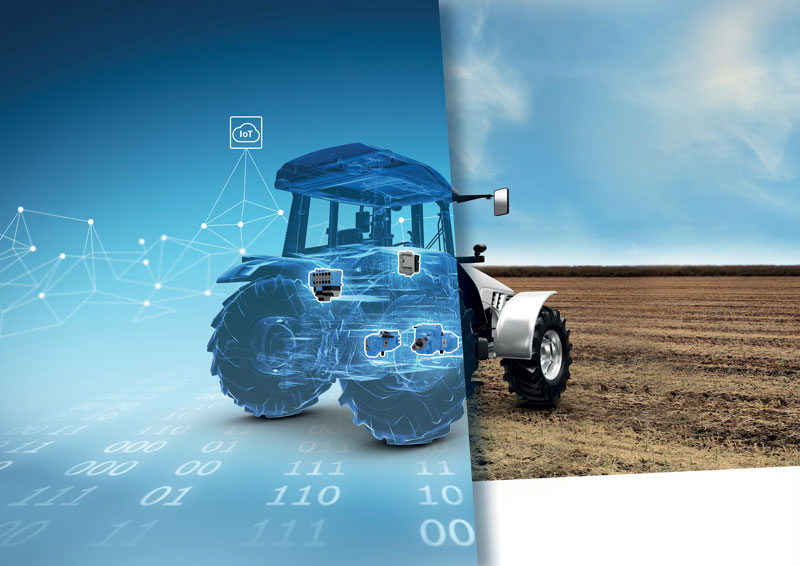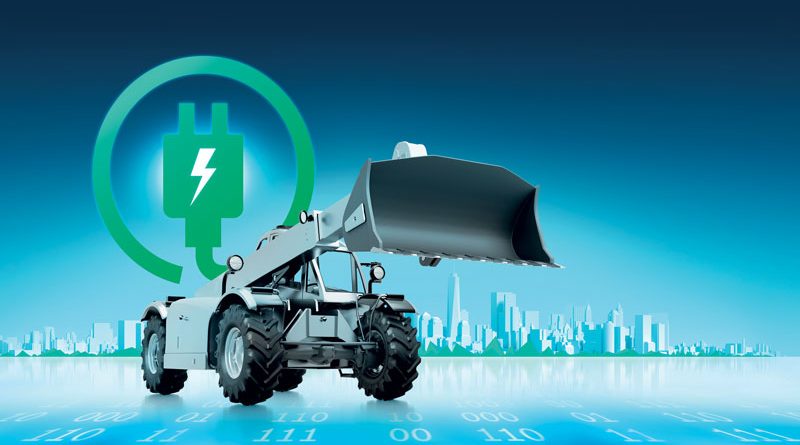Mobile Machines: from electrification to digitization
The Off-Highway market is going through an effervescent period that will change the way mobile machines are designed and built. But how should these changes be interpreted? And how can we exploit the huge potential of the latest market trends? Bosch Rexroth talks about its vision and explains why we’re already living a bit of the future today.
Bosch Rexroth accompanies and supports its customers in this current transformation with tailor-made components, systems and software functions, created thanks to its great expertise in hydraulic components and systems for mobile applications and its extensive application know-how.
This approach makes it a valuable system partner for manufacturers developing safer and smarter mobile machines that guarantee higher performance and not only work more efficiently and profitably, but also meet the necessary safety and environmental standards. A partnership with Bosch Rexroth gives manufacturers the support they need to manage the complexity of their vehicles, fully exploiting the enormous potential of technologies such as IoT, digitalization and automation.
The evolution of mobile applications
The market for mobile applications is constantly changing. New technologies and production processes can help us meet the growing demand for food for the world population, boost crop yields, build supercities and procure essential raw materials. To tackle the problem of climate change, electrification comes to our aid by helping reduce emissions. Today’s manufacturers are also faced with the challenging task of managing increasing technological complexity with limited resources. Digitization is opening up new ways of enhancing the efficiency, productivity, availability, safety and comfort of machines by automating specific functions or the entire system.
A regulatory framework that drives change
Legislation to protect the environment and combat climate change is the key driver behind the electrification trend in mobile machinery. The efforts made in the On-Highway market to reduce exhaust emissions are now a reality in the Off-Highway segment as well. The setting of global standards aimed at reducing emissions is pushing towards a decisive change. And the new technologies go hand-in-hand with this trend. Electrification, for example, offers new possibilities for drastically reducing noise emissions that have a huge impact on night work in urban areas.

A shift to hybrid or full-electric vehicles by 2030
Bosch Rexroth estimates a significant increase in the share of hybrid or full-electric vehicles by the year 2030. In many areas, this trend is accompanied by public initiatives pushing to minimize polluting emissions. The challenge for manufacturers in this context is considerable because, unlike the automotive market, it’s not just a matter of electrifying the drive systems: here the entire vehicle concept is at stake. With its range of electrification components, systems and software solutions that can easily work together, Bosch Rexroth supports both the electrification of existing conventional vehicles and the construction of new machines. This broad approach allows machine manufacturers to develop the best possible system topology for their application areas, while at the same time ensuring full compliance with regulatory standards for exhaust and noise emissions. Within this sphere, Bosch Rexroth’s range extends from hybrid to full-electric solutions.
Compliance with the safety standards
When it comes to the machine architecture of the latest vehicles (including the transmission, hydraulic functions and semi-automatic functions), manufacturers must take into due account the regulatory safety standards relating also to working safety – both for operators and on the roads.
Thanks to the expertise derived from the technological areas of Factory Automation, the new range of electrification components already features built-in ”Safety on Board” functions in both 100% electric and hydraulic systems. From the manufacturers’ point of view, this is a great advantage because it means the functional safety required by the Machinery Directive is already guaranteed. As part of workplace safety, Bosch Rexroth also ensures the safety standards required for wiring operations in high-voltage areas. Assistance systems provide the necessary safety in relation to automatic or semi-automatic functions while working or driving. Environmental monitoring functions via radar and video cameras, for example, guarantee adequate protection against collisions when reversing, thereby contributing to the safety of people and machines.
Managing complexity
The introduction of new technologies such as IoT, electrification and automation make the vehicles far more complex. Equally, the time to market for new models is getting shorter and the resources that companies devote to development can’t be stretched indefinitely.
As a result, many machine manufacturers choose to work with a reliable and competent partner who can help them manage this growing complexity. What are the foundations of this collaboration? If we take the case of the latest Rexroth components, it’s fair to say that manufacturers can already reduce the level of complexity of their applications at component level right now. Replacing a classic pump controlled by a hydromechanical system with a new electronic solution for instance, the complexity of the control system is cut by at least 50%. This figure will be even greater if the complexity is then transferred from the hardware component to the software, not forgetting that, in terms of performance, the new technologies usually give higher levels of dynamism, accuracy and stability of the solution.
New strategies for a changing scenario
By combining its technological skills and wide application know-how, Bosch Rexroth is able to sustain the construction of the next generation of mobile machines: combine harvesters that operate with absolute precision, construction machines that dig or level in a precise, powerful and automated way, material handling machines equipped with zero-emission electric drives. In short: hydraulic technology ready for the challenges of this century.
The elements this new approach is based on are the in-depth knowledge of operating machines and the specific needs of machine manufacturers, and the great potential of the new electronic and electro-hydraulic systems and of the digital technologies and product configurators that quickly and flexibly give the OEMs the technological solutions they need.
The transition to new technological trends: now, next and beyond
In order to meet the specific needs of customers facing the technological evolution of the Off-Highway world, the technology portfolio of Bosch Rexroth hydraulic and electro-hydraulic components and systems is constantly renewed to embrace the latest technologies. It’s also true, however, that this technological transformation doesn’t affect all market segments in the same way and at the same pace. Bosch Rexroth therefore remains alongside its customers with a value proposition covering all the phases of market transition towards digital transformation, which can be summed up in 3 levels:
– Now. Integrated solutions for mobile machines;
Bosch Rexroth is the technology partner chosen by those working in the fields of hydraulics, electronics and IT solutions, adding advanced software functions to create intelligent mobile machines that guarantee safety and efficiency.
– Next. Smart mobile machine systems; connected, adaptable, scalable and integrated
Bosch Rexroth is the technology partner for those who develop highly integrated and flexible solutions (regardless of the drive technology – hydraulic, electronic or electric) and software for managing the transfer and future work functions. The range focuses on the needs of customers wanting systems that can be easily integrated and applied on mobile machines.
– Beyond. Semi-automatic and automatic assisted functions for self-learning mobile machines;
Bosch Rexroth is the technology partner chosen by those developing innovative hydraulic, electronic, electric and IT solutions with fully integrated software functions for autonomous and electrified mobile machines, linked to our IoT ecosystem to facilitate flexible concepts ranging from intuitive manual operation to completely autonomous solutions.

